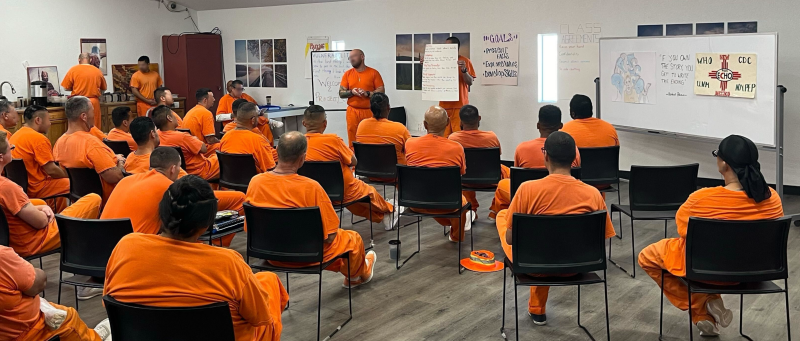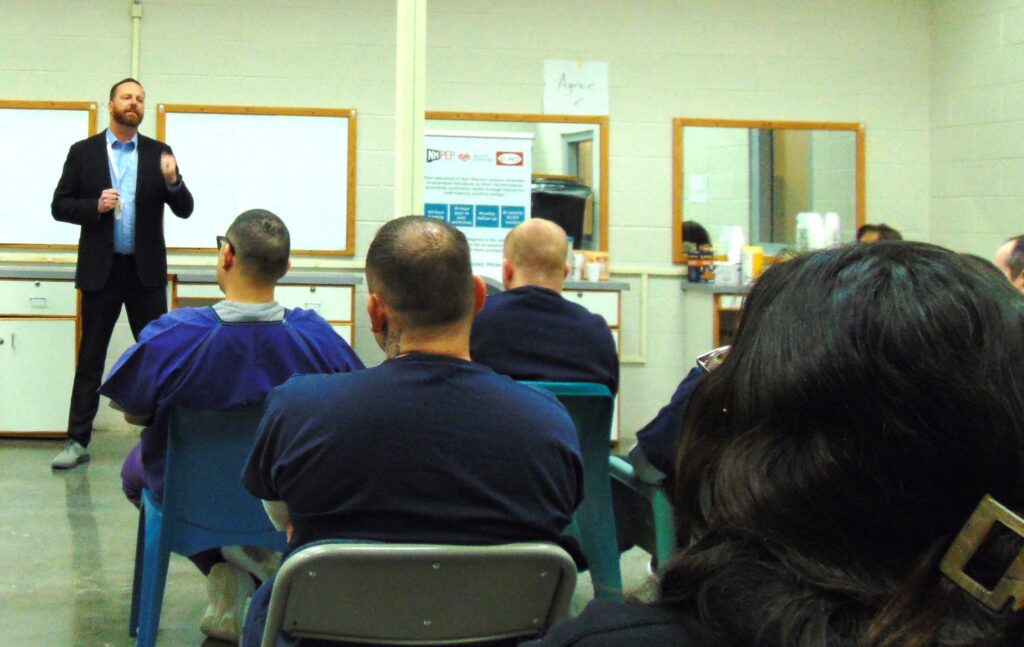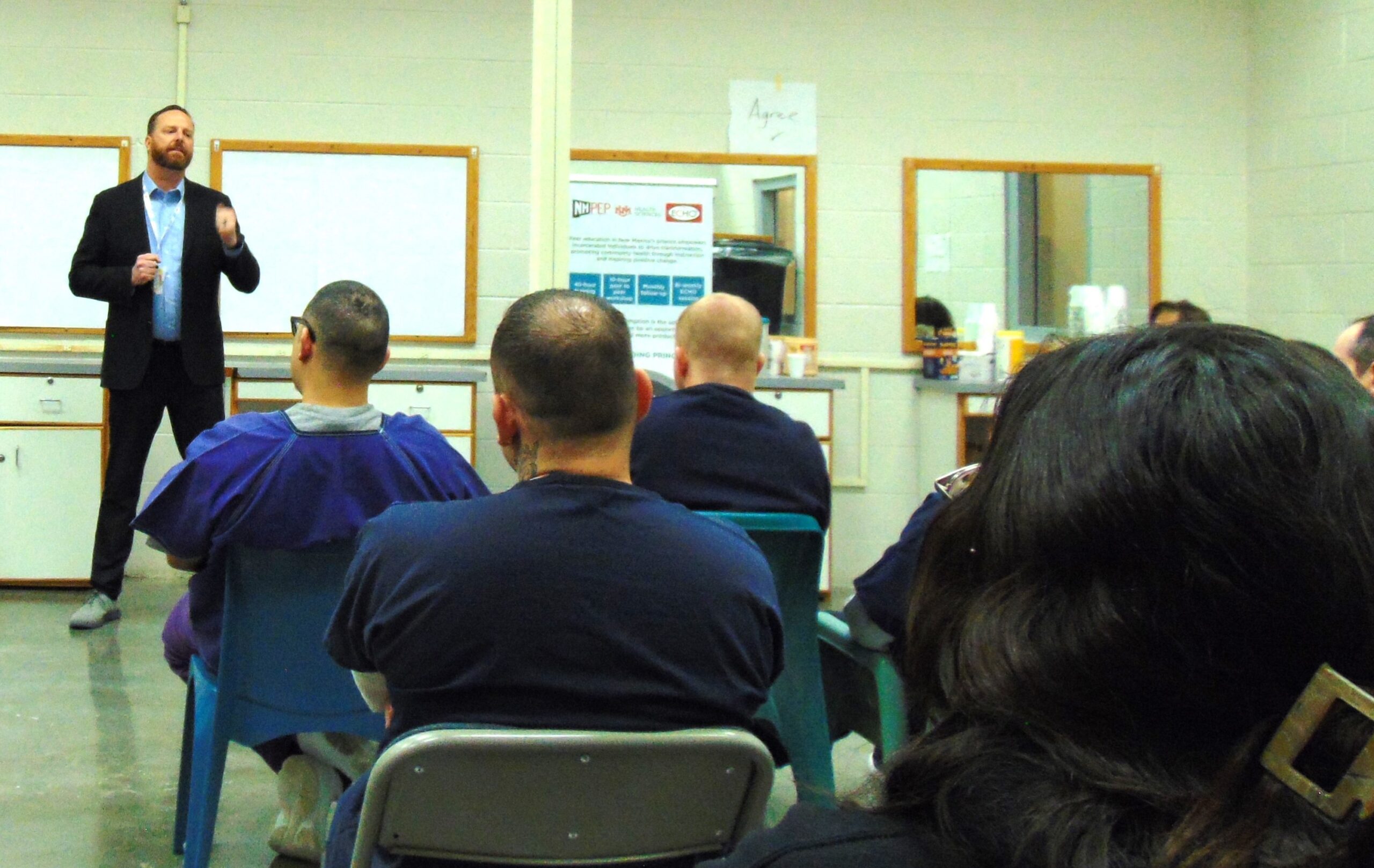The New Mexico Peer Education Project launched in 2009 to address hepatitis C in the state’s prisons by using the ECHO Model.
Karla Thornton, MD, was already involved in a corrections health ECHO program. “I heard about patients with hep C being presented every week—often with acute hep C,” she recalls. “It got me thinking that we really needed to start upstream and get people educated.”
Looking for a low-cost solution, Dr. Thornton hit upon PEP, which trains inmates to work as peer educators, sharing information with their fellow inmates to reduce risky behaviors. The program was put in place to educate on needle sharing, lowering reinfections, improving hygiene, and an increase of testing and treatment.
The program started at a single prison facility, in partnership with the New Mexico Corrections Department. Today, PEP operates in all of New Mexico’s prisons—eight state owned and two privately operated ones—and continues to grow outside of New Mexico: Indiana, Canada, Colorado and the Dominican Republic have implemented PEP at their facilities.

A New Mexico Peer Education ECHO Program at the Roswell Correctional Center. Faces blurred for privacy. Photo Credit: Chaplin Brazil, NM Corrections Department, 2023.
Hepatitis C Treatments Skyrocket: From 0 to 1,500
As of November 2025, the New Mexico PEP team has trained 1,150 peer educators, who, in turn, have educated more than 40,000 incarcerated people on hepatitis C and other diseases. Paired with systemic efforts including universal inmate screening and discounting drug pricing, the PEP team’s work is showing results. In 2003, no inmates were receiving hepatitis C treatment; by the year 2021, more than 600 inmates had received hepatitis C treatment that year. Within the next year, 1,500 inmates were treated.
“The Peer Education Program has enabled the New Mexico Corrections Department to share a powerful message of mentorship. Peer educators connect with inmates in a way that staff cannot. This connection is invaluable, especially when addressing critical topics such as health care and reentry into society,” says Alisha Tafoya Lucero, cabinet secretary of the New Mexico Corrections Department. “Leveraging these peer relationships to support inmates’ success in the community is essential. Our goal is for inmates to leave the system healthier, equipped with the skills and knowledge necessary to lead productive lives.”
PEP’s success has garnered Project ECHO national and international recognition as a way to help eliminate the burden of hepatitis C. Francis Collins, MD, Ph.D., President Joe Biden’s science advisor, has called ECHO a key solution for eliminating hepatitis C nationwide. Recently, The New York Times highlighted the effectiveness of PEP.
The Power to Transform Lives
Despite all its accomplishments, PEP isn’t just about hepatitis C—in fact, it hasn’t been from the start. More than anything, PEP is about giving incarcerated people a new chance at leading healthy, productive lives after they leave prison and return to their communities.
Daniel Rowan, one of the program’s first peer educators, was incarcerated for three and a half years. Now, he’s the senior manager of the PEP program. PEP, he says, has changed his life.
It starts, he says, with the 40-hour training to become a peer educator. “The training opens a door to transformation and improvement. It’s a unique opportunity to develop agency within a correctional setting. Through PEP, Rowan learned to use his voice and speak publicly. He thrived as an educator, acquiring leadership skills along the way.
“Peer education is a way to live in the community you’re in and contribute to that community and be of service,” he says. Rowan believes that the partnership between the Corrections Department and Project ECHO has much to do with the program’s success. “As an inmate, working as a colleague with ECHO and corrections staff is a special thing.”

Daniel Rowan, senior manager of the New Mexico Peer Education ECHO Program, leads a session at the Lea County Correctional Center. Photo Credit: Dan Hutchinson, NM Corrections Department, 2023.
A Solution Led by Former Inmates
For Dr. Thornton, the proof in the pudding is the fact that the program is now led by people who were formerly incarcerated. “That’s what makes it really powerful to me,” she says. “All the change and innovation came from that.”
Along the way, PEP has expanded its programming. In July 2020, the New Mexico Community Peer Education Program began providing support for people recently released from prison who are on probation or parole, as they transition back into their communities. Like PEP, CPEP is a voluntary, peer-led partnership with the state Corrections Department. Its goal is to reduce recidivism by helping formerly incarcerated people re-entering society deal with challenges like employment, housing, health care, transportation by providing them with education, resources and referrals.
Fifteen years ago, PEP launched on the premise that “inmate health is community health,” because eventually the majority of incarcerated people return to their communities. Today, PEP offers a continuum of transformational opportunity and support for people who are incarcerated to find their voices and create new lives for themselves.
For more information about the New Mexico Peer Education Project, email the program team.
Originally published in December 2024, this article was updated in November 2025 to include Colorado among the list of states that have implemented PEP programs at their facilities and to update the number of peer educators trained (1,150) and the number of of incarcerated people reached (40,000).



